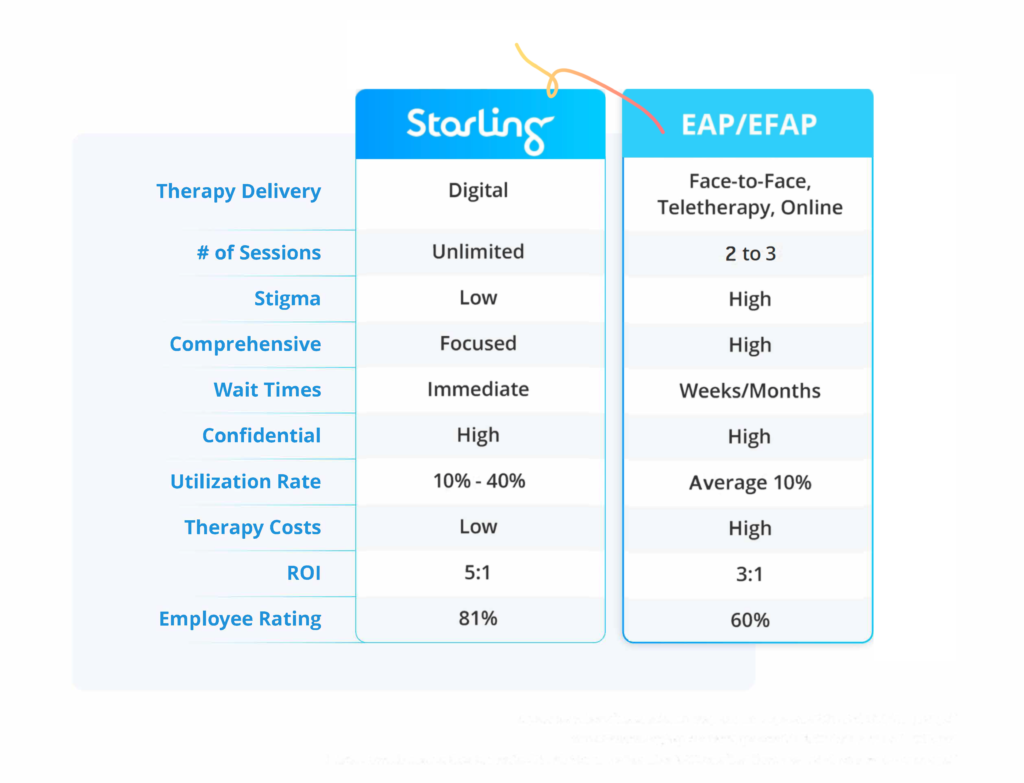An employee assistance program (sometimes referred to as an EAPs/EFAPs), is an employee benefit program that assists employees with personal and/or work-related problems. The purpose of EAPs is to minimize the impact these problems can have on an employee’s job performance, health, mental and emotional well-being.
EAPs generally offer free and confidential assessments, short-term counselling, referrals, and follow-up services for employees. EAP counsellors would first identify a caller’s struggles and will refer them to a specialist. Depending on the referral type, EAP counsellors may work in a consultative role with managers and supervisors to address employee and organizational needs.
There are three types of referrals:
- Self-Referral: When an employee makes contact with the EAP on his/her own accord
- Informal Referral: When a supervisor, union member, co-worker, family member or community professional recommends or suggests that the individual use their EAP
- Formal-Referral: When the performance of an employee has declined and is referred to their EAP
Digital mental health programs assist employees with a host of personal and work-related problems that may impact their job satisfaction, productivity, health, and emotional well-being. When used to its full potential, digital e-mental health programs can alleviate the top three barriers impacting employees’ mental health: stigma, cost, access, and shortages in licensed therapists
Digital mental health programs generally offer free and confidential assessments, followed by a personalized treatment tailored to each employee’s unique stressors based on their assessment results. The referral process depends on the platform type. For Starling Minds, our Mental Fitness program does not require any paperwork, and our Return-to-Health program enables easy referral by using a simple 2-step process.
How do referrals work for the service or platform?
Today’s digital solutions like Starling Minds offer cognitive behavioural therapy (CBT) on an on-demand model, meaning instant access to treatment when employees want or need it. There are many types of digital solutions, but for most the employer would pay to provide the service to their staff. No insurance or claims need to be triggered to access Starling Minds.
Many of today’s free EAPs operate on an assess-and-refer model. Employees who want mental health support would call the EAP phone number, but are often referred to a long-term treatment provider outside of the EAP instead of receiving traditional counselling. This triggers a claim on the employer’s healthcare plan, leading to greater premiums for employers.
What support do employees get?
Digital platforms typically focus on alleviating less symptoms, but target issues heavily impacting workforce mental health. Starling Minds’ online CBT platform focuses on treating employees working in high-stress environments on a daily basis. The platform focuses on treating employees struggling with family, relationship, household, and finance issues, as well as their personal grooming and hobbies.
Employee Assistance Programs are currently being used when employees are at-risk of developing a physical, mental, or emotional health issue, and need support. The program offers a wide range of support to employees experiencing stress, relationship issues, finances, physical health, depression and anxiety, or parenting challenges.
According to a Benefits Canada report, across a potential 35 core issues, people might be calling an EAP for, about 60% have to do with the top five areas: relationship issues, personal and workplace stress, depression and anxiety.
How does the service or platform offer support?
The Starling programs deliver support digitally via desktop or mobile with technology to help define the nature of the employee’s problem and tailor the treatment to those stressors. The employee would just need wifi to view the platform’s modules, videos, and interactive exercises.
EAPs deliver counselling support through online resources (internet-based), e-counselling (email), video counselling (webcam, secure internet software), traditional (face-to-face), and live chat (landline or texts) to cover a range of user types and preferences.
How many sessions do employees get?
Starling Minds offers unlimited access to the platform and a library of treatment resources to support employees during and after treatment to sustain their mental health.
EAPs will offer between two to three counselling sessions to employees as part of the service. Any more would need to be covered by their insurance or out of their own pockets.
How does the platform or service reduce the stigma around mental health?
Starling Minds’ services help organizations reduce stigma by demystifying mental health for leaders, managers, and employees. The platform is also confidential and anonymous, with an online community to help employees understand they aren’t alone in their mental health journey.
EAP training workshops focus on its array of services/products to support employees through work, but it doesn’t reduce stigma or educate them on mental health or the extent to which their peers are struggling as well.
What services are included in the solution or platform?
Starling Minds’ online CBT platform focuses on treating work-related stress, anxiety, and depression. It is appropriate for employers who are looking to proactively help employees manage their mental health or build their mental resilience and coping abilities while on-leave. Starling offers a host of services to help employers launch and increase platform adoption, manage programs, and gain insights into benchmarking and ROI for strategic planning purposes.
EAPs services include health and safety, financial and legal, work-related issues, and relationship and family matters support. It is appropriate for employers looking for a wide range of offerings for total overall health, but with less emphasis on mental health or in-depth treatment options.
What are the wait times like?
Starling Minds offers immediate access to employees with a registration link or referral from their disability manager. Disability managers would not need to get approval from anyone to refer Starling Minds to employees.
EAP Counsellors are available 24/7 and are trained in psychology and counselling. There are some providers that can only offer limited counselling services and would need to refer them to another specialist. Once the EAP counsellor refers an employee to a specialist, the wait times can be anywhere up to a year due to the COVID-19 pandemic.
How confidential is the service or platform?
Starling Minds’ digital platform complies with privacy and data security provisions at all times, guaranteeing confidentiality for employees. Similar to EAPs, should someone be identified as at risk of self-harm or of harming others, our therapy team will follow up with them in an email and alert our client contact and appropriate authorities to support the employee immediately.
EAP services are confidential. The EAP doesn’t let an employer or anyone else know that anybody has called unless consent and written permission have been given. The only exception to this rule of confidentiality is if the EAP counsellor learns that someone is at risk of self-harm or of harming others. In this case, the counsellor may be required to report the situation to the appropriate authorities.
How many employees actually use the service or platform?
Digital platforms like Starling Minds have utilization rates between 10% – 40%, due to our easy to use platform, practical CBT tools, workshops to demystify mental health, and engagement campaigns to promote the importance of mental health at work for organizations.
EAPs on average have a utilization rate of 10% across employee populations.
One reason the usage of EAPs is low is due to the employees’ perception that somehow, in some way, their EAP is not confidential and that their manager or HR department will be made aware of their mental health issues, work pressures or difficulties with their supervisor.
Of the 10% of employees using EAPs, EAP counsellors have referred 77.9% of employees to mental health treatment, but only 47.5% of them received services, meaning 30% do not receive support for their mental health or emotional issues, largely due to stigma or fear of job loss.
What’s the cost per employee?
For Starling Minds, an organization could pay $12 – 60 per employee/annually for our Mental Fitness program depending on the level of support teams need for launching, adopting, implementing, and program managing. Our Return-to-Health program varies but would cost a fraction of the price to human-guided therapy. Our services do not cap or limit platform features or sessions.
For EAPs, an organization would pay $10 – 100 per employee/annually depending on set-up costs which can be $35 per employee. EAP services for mental health support are capped at $400 – 600 with limited sessions (between 2 to 3).
What are the customer services offered?
Starling Minds’ customer success team are assigned to each client to help organizations demystify mental health for leaders, managers, and employees through workshops. Our Customer Success team also helps organizations launch, adopt, implement, and manage their programs together as strategic partners. Although we are a digital platform, our therapy team monitors and escalates any at risk of self-harm members to the appropriate parties and authorities.
EAP Orientation programs are designed to train managers/employees on the support/benefits available to them, although they do not educate workforces on mental health and its link to job satisfaction, engagement, and performance. EAP counsellors are available 24/7 to answer or escalate any calls from employees looking for support or at risk of self-harm.
What are the business outcomes of the service or platform?
The typical return on investment (ROI) of Starling Minds is $5 or more, for every $1 dollar invested due to the digital aspect of our platform which makes our service immediate, affordable, scalable, and accessible.
The typical return on investment (ROI) of an EAP is $3 or more, for every $1 dollar invested, according to the Employee Assistance Trade Association.
Does the service or platform take a preventative approach?
For Starling Minds, two-thirds of our users passively absorb the platform’s content to either proactively learn more about mental health or assess their mental health and test a few modules. The last one-third of users are highly engaged with the program in order to get emotional pain relief and support.
Although EAPs have prevention, early-intervention, and crisis support, most employees do not use the service until they are really struggling. This is due to the stigma around EAPs, therefore only employees experiencing at-risk symptoms or struggling with their mental and emotional health will use the service.
Are employees satisfied with the service?
According to our data, 77% of Starling members believe the service improved their mental health citing the practical tools, emotional relief, online community, and easy-to-use interface as the reason for their rating.
For EAPs, 39% of plan members believe the service is excellent or very good, but value other benefits such as dental, vision, massage therapy more. EAPs tend to have less in-depth offerings, longer waitlists, and more complicated processes to gain access to support.
What have the clinical results been?
For Starling Minds, 91% of Starling members using our Mental Fitness program feel more resilient after program completion and 83% of Starling members feel more confident about returning to work after completing our Return-to-Health program.
For EAPs, 73% of members believe their symptoms have been reduced largely due to their face-to-face treatment sessions.
Quick Recap Chart
Here is a quick summary of the differences between Digital Mental Health solutions like Starling Minds and EAPs.

Last Thoughts
When EAPs are used to its full potential, it can help support employees with broader ranges in personal or work-related problems than digital solutions.
Unfortunately, EAPs are often under-utilized, with stigma, confidentiality issues, limited sessions available, and wait times as some of the greatest barriers to overcome. There is also a persistent fear in employees that, despite safeguards guaranteeing confidentiality, management will find out who is using the EAP programs and the employee will be branded. Most EAP utilization initiatives fail to address the impact of stigma, misconceptions around mental illness, or helping employees know what’s actually in their EAPs.
When digital mental health programs are used to its full potential, it can help support organizations with the greatest workforce challenges: work-related stress, anxiety, and depression.
Digital platforms often have greater utilization rates due to the platforms’ ability to notify and remind employees to carry on with their treatment. As a result, organizations have a greater ROI with digital platforms like Starling Minds. Digital platforms also alleviate the top three barriers impacting employees’ mental health: stigma, cost, access, and shortages in mental health support, without compromising the quality of care delivered to employees.




